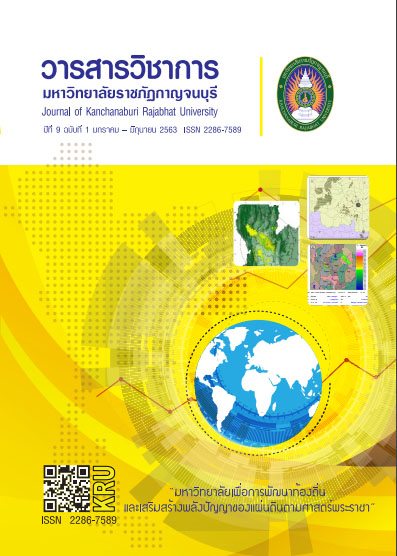AGRO-TOURISM MANAGEMENT STYLES IN CHANTHABURI PROVINCE
Main Article Content
Abstract
This study aimed: (1) to study the classification of Agro-tourism Management Pattern in Chanthaburi Province and (2) to present styles of Agro-tourism Management in Chanthaburi Province. Qualitative analysis was undertaken, using 14 agricultural groups which were selected through purposive sampling from agricultural group who participated in the program “Delicious all the farms testing to every garden” in 2016 and involved with the management of agro-tourism in Chanthaburi province. The sample also included 8 the staff from public and private sectors who were involved in the management of agro-tourism in Chanthaburi province. The study was performed using Rural Rapid Appraisal. Synthesis analysis was conducted through in-depth interviews, group discussion and brainstorming/stakeholder meetings for qualitative study. The results revealed the significant issues via SWOT Analysis, Typological Analysis and Systematic Inventive Thinking as follows:
- There were two types of Agro-tourism business management in Chanthaburi Province which were 1) the proprietorship who owned orchards and opening of ago-tourism with special activities and 2) community enterprise which was an ordinary partnership or non-corporate groups and managed Agro-tourism in the joint operating characteristics within the same social community. Four dimensional analysis revealed: (1) human dimension; lack of personnel either Agro-tour leaders and Agro-tourism service providers in both quantity and quality, (2) productivity dimension; when the products were not enough for tourists, the Argo-tourism owners had to buy from other sources but the problem was that fruit lacked quality, (3) marketing dimension; activities of Argo-tourism in Chanthaburi Province were similar in orchards. Meanwhile, the Argo-tourism owners lacked the public relation skills specifically, through social media online, (4) financial dimension; the collecting financial document was not systematic, therefore, financial data could not be used as a business decision making.
- For presenting Agro-tourism Management styles in Chanthaburi Province, the implementing of the 4-dimension management would be divided into separated activities and regrouped to make new styles of Argo-tourism. Thus, there were 3 styles of Agro-tourism management in Chanthaburi province, namely 1) Niche Market Style of Agro-tourism management, 2) Zoning Style of Agro-tourism management, and 3) Learning style of Agro-tourism management.
Article Details
References
กรมส่งเสริมการเกษตร. (2541). โครงการท่องเที่ยวเกษตร ปีท่องเที่ยวไทย 2541-2542. กรุงเทพฯ : การท่องเที่ยวแห่งประเทศไทย.
เดชา โต้งสูงเนิน. (2543). การบริหารจัดการท่องเที่ยวเกษตร กรณีศึกษา บ้านม่วงคำ ตำบลโป่งแยงอำเภอแม่ริม จังหวัดเชียงใหม่. การค้นคว้าแบบอิสระ ศิลปศาสตร์มหาบัณฑิต สาขาการวิชาจัดการมนุษย์กับสิ่งแวดล้อม บัณฑิตวิทยาลัย มหาวิทยาลัยเชียงใหม่.
นริศรา สุธนเสาวภาคย์. (2545). การวิเคราะห์ศักยภาพของการพัฒนาเป็นแหล่งท่องเที่ยวเชิงเกษตรที่เป็นที่มาของรายได้นอกภาคเกษตรกรรม. วิทยานิพนธ์วิทยาศาสตร์มหาบัณฑิต สาขาวิชาเศรษฐกิจธุรกิจ คณะเศรษฐศาสตร์ มหาวิทยาลัยเกษตรศาสตร์.
พิมพา หิรัญกตติ, อุดม สายะพันธุ์, เกยูร ใยบัวกลิ่น, สุพรรณี อินทร์แก้ว, สมชาย หิรัญกิตติ. (2557). พฤติกรรม การท่องเที่ยวเชิงเกษตรของนักท่องเที่ยวชาวไทย. วารสารสุทธิปริทัศน์, 28 (88), 362-384.
รัฐนันท์ พงศ์วิริทธิ์ธร. (2558). แนวทางการพัฒนาการท่องเที่ยวเชิงเกษตรเพื่อความยั่งยืน : โครงการหลวงปางดะ. วารสารเทคโนโลยีสุรนารี, 9(1), 19-35.
Boyd, D. and Goldenberg, J. (2013). Inside the Box Creativity: A systematic method for yielding extraordinary innovation. New York: Simon & Schuster.


